- Home
- Shelby Foote
Shiloh Page 2
Shiloh Read online
Page 2
it had passed beyond a mere question of Honor now —his skill as a marksman was being ridiculed. Years later my father, who was one of the seconds, said it would have been highly comical if it hadn’t been deadly serious. Huston finally managed to steady himself, angry as he was, and put the sixth shot into Johnston's hip.
After a slow and painful five weeks spent recovering from the wound, during which time Texas won her independence, Johnston served as Secretary of War in the cabinet. About this time he married a young cousin of his first wife—mainly, my father said, to have someone to mother his children. His share in the Mexican War was limited by politics, but he fought at the Battle of Monterey under Zachary Taylor, whom he much admired. My father was there too and told me afterwards that Johnston fought in the garb of a typical Texan, wearing a red flannel shirt and blue jean pants, a checkered coat and a wide-awake hat; but I was never able to imagine him dressed that way, no matter how hard I tried.
After the war he retired to China Grove plantation in Brazoria County, enjoying life with his family, until in late '49 he was recalled into the U. S. Army by old General Taylor, who had been elected President. Six years later, Jefferson Davis, Secretary of War under Franklin Pierce, gave him command of the newly organized 2d Cavalry, and he spent the next two years fighting Indians on the frontier. Robert E. Lee was his lieutenant colonel, William Hardee and George Thomas his majors. In the late '50s he led his troops against the Mormons out in Utah, and when he returned east in i860, brevetted brigadier, he was appointed to command on the Pacific Coast, with headquarters at Fort Alcatraz near San Francisco. When Texas seceded he crossed the desert with thirty pro-Southerners and became the ranking field general on the active Confederate list. After him came Lee, Joe Johnston (no kin) and Beauregard.
That was his life, and it was a simple one. He knew disappointments, including the death of the one he loved most in the world, had a conspicuous share in a successful revolution, and knew the humdrum life of a country farmer. Then, at a time when he had every right to think he was through with war and the call of glory, he found himself at storm center of the greatest event of his country's history. At first there had been praise. Then had come vilification. And now, standing beside the road and watching his troops start out on their march against the army that had pushed him back three hundred miles while the clamor of the South rang in his ears, accusing him of incompetence and even treason, there was satisfaction for himself and justification in the eyes of the people.
The weather was clear, not a cloud in the sky when the march began. Regiment by regiment the army lurched into column, rifles dressed at right shoulder shift and the men stepping out smartly, lifting their knees as if on parade. Then the rain began. At first it didn’t bother them, not even the abrupt, thunderous showers of Mississippi in April; but soon the wheels of the wagons and the artillery had churned the road into shin-deep mud, and after the first dozen laughs at men who slipped and sprawled, it began to wear thin. There were halts and unaccountable delays, times when they had to trot to keep up, and times—more frequent—when they stood endlessly in the rain, waiting for the man ahead to stumble into motion. The new muskets grew heavy; haversack straps began to cut their shoulders, and there was less laughter and more cursing as the time wore past. Friday, when I approached the column from the rear, the road was littered with discarded equipment, extra boots, sabers and bowie knives, overcoats. Bibles and playing-cards. At one point, four miles out, there was a steel vest thrown into a fence comer, already flecked with rust but gleaming like old silver in the rain.
All that day as I moved along the column I came upon regiments halted beside the road, the troops leaning on their rifles while the commanding general's address was read to them by their colonels. General Johnston had written it Wednesday night in Corinth while we were composing the battle order.
Soldiers of the Army of the Mississippi: I have put you in motion to offer battle to the invaders of your country. With the resolution and discipline and valor becoming men fighting, as you are, for all worth living or dying for, you can hut march to a decisive victory over the agrarian mercenaries sent to subjugate you and to despoil you of your liberties, your property, and your honor. Remember the precious stake involved; remember the dependence of your mothers, your wives, your sisters, and your children, on the result; remember the fair, broad, abounding land, and the happy homes that "would be desolated by your defeat.
The eyes and hopes of eight millions of people rest upon you; you are expected to show yourselves worthy of your lineage, worthy of the women of the South, whose noble devotion in this war has never been exceeded in any time. With such incentives to brave deeds, and with the trust that God is with us, your generals will lead you confidently to the combat — assured of success.
A. S. Johnston, General commanding.
I heard it delivered in all styles, ranging from the oratorical, with flourishes, to the matter-of-fact, depending on the colonel. Many of them had been public men, and these made the most of the occasion, adding remarks of their own and pausing between sentences and phrases for the applause of their men, particularly-after "women of the South" which was good for a yell every time. But generally speaking the result was the same: the troops cheered politely, lifting their hats, then fell back into ranks to continue the march.
Bragg had almost as many men as the other three commanders put together. Marching all day Friday, he made just six miles, so he had to send word for Hardee to wait for him beyond the crossroads where their columns would converge. It must have galled him to have to send that message, for when I carried a dispatch to him that night at his roadside camp he was hopping mad. He was not yet fifty, a tall gangling man made ferocious-looking by thick bushy eyebrows which grew in a continuous line across the bottom of his forehead. He was a West Pointer, a hero of the Mexican War, and his troops were acknowledged to be the best-drilled in our army.
They got that way because of the strictness of his discipline. I heard once that one of his soldiers attempted to assassinate him not long after the Mexican War by exploding a twelve-pound shell under his cot, and I believe it, for there were men in his corps on the present campaign who would go that far in their hatred of him; or at least they said they would. Anyhow, he left the army about that time and came to Louisiana and became a sugar planter in Terre Bonne parish and I heard he made a good one. I never knew him down there, but I used to hear my father speak of him. Indeed, his name was known everywhere because of what old Rough-and-Ready Taylor was supposed to have said to him at Buena Vista: "A little more grape, Captain Bragg," though later I heard my father tell that what General Taylor really said was "Captain, give 'em hell." When Louisiana went out of the Union he was put in command of her volunteer forces, and later President Davis appointed him brigadier general and sent him to Pensacola to be in charge of Confederate troops down there. He had a reputation for firmness in everything. If his men didn’t love him, at least they respected him as a soldier, and I believe Bragg preferred it that way.
Hardee waited, as Bragg had requested, and it was late Saturday evening before all the troops were in position to attack. No wonder Beauregard wanted to go back and start all over again: in his mind, surprise was everything, and he had good cause to believe that the enemy knew we were there. When the rain let up the men began to worry about the dampness of the powder in their rifles; but instead of drawing the charges and reloading, they tested them by snapping the triggers as they marched. All Saturday evening there was an intermittent banging of muskets up and down the column, as rackety as a sizeable picket clash.
And that wasn’t all. When the sun came out, their spirits rose; everything that had been pent up in them during three days of marching and waiting in the rain came out with the sun. They began to shoot at birds and rabbits along the road. West of Mickey's, within two miles of the Federal outposts, I watched an entire regiment bang away at a little five-point buck that ran the length of the column down a field adjoining
the road. They were Tennessee troops who prided themselves on their marksmanship, but so far as I could tell, not a ball came within ten feet of that buck; he went into the woods at the far end of the field, flaunting his white suit. It was about this time, too, that many of the men began to tune up their yells, screaming like wild Indians just for the fun of it.
And that was not all, either. At one point Saturday evening Beauregard heard a drum rolling, but when he sent orders to have it silenced, the messenger came back and reported that it couldn’t be done—the drum was in the Union camp. Beauregard reasoned that if he could hear enemy drumtaps, there was small doubt that the Federals had heard the random firing and whooping in the Confederate column. Our whole advantage lay in surprising them, he believed, and since we plainly had lost all chance for surprise, it was best to call off the attack until another time. That was when he rode away and located Bragg and Bishop Polk, to whom he had been giving his opinion about abandoning the battle plans when General Johnston came up and decided against him. "I'd fight them if they were a million," the general said.
While the troops were deploying for battle, three lines of ten thousand men each, with the reserve of six thousand massed in the rear and cavalry guarding the flanks at the two creeks, the sun set clear and red beyond the tasseling oaks on tomorrow's battlefield. There was a great stillness in the blue dusk, and then the stars came out. The moon, which had risen in the daylight sky, was as thin as a paring, a sickle holding water but unclouded. I never saw the moon so high, so remote—a dead star lighting a live one where forty thousand men, young and old but mostly young, slept on their arms in line of battle, ready for the dawn attack through the woods before them. God knows what dreams came to them or how many lay there sleepless thinking of home.
General Johnston slept in an ambulance wagon. We staff members unrolled our blankets about a small campfire, and for a while we lay there watching the firelight flicker. Every now and then there would be a scrap of talk, mainly about how good it was that the weather had cleared, but it wouldn’t last long; presently it would break off of itself, the way talk will do when the speaker has his mind fixed on something that has nothing to do with whatever he is talking about. Finally there was only the deep, regular breathing of the sleepers and the quiet night beyond the low dome of light from the fire and the high dim stars coming clearer as the embers paled.
I thought of my father, who had been a soldier himself and lost an arm in Texas fighting under the same man I would fight under tomorrow, and of my mother who died when I was born and whom I knew only as a Sully portrait over the mantel in my father's study and some trunks of clothes stored in the attic of the house in New Orleans. It seemed strange. It seemed strange that they had met and loved and gone through all that joy and pain, living and dying so that I could lie by a Tennessee campfire under a spangled reach of April sky, thinking of them and the Hfe that had produced me.
Then all at once, as I was falling asleep, I remembered Sherman that Christmas Eve at the academy in Louisiana, the way his tears were bright against his red beard as he walked up and down the room where the headline in the paper told of the secession of South Carolina. I was seventeen then, a long time ago. "You are bound to fail," he said. "In the end you’ll surely fail."
Now somewhere beyond that rim of firelight, sleeping in his headquarters tent on the wooded plateau between those two creeks, he probably had long since forgotten me and all the other cadets. Certainly he never imagined some of them were sleeping in the woods within a mile of him, ready to break upon his camp before sunup.
Again the sleep came down, but just before it closed all the way, I saw again the vision that had come to me a hundred times before: The battle is raging, flags flapping in the wind and cannon booming, but everything shrinks to one little scene: Sherman in the Yankee brigadier's uniform and myself facing him, holding him prisoner, the pistol level between us. "You see," I say. "You were wrong. You said we would fail but you were wrong," and he says: "Yes: I was wrong. I was wrong, all right," watching the pistol, the tears still bright in his beard.
I had thought I wouldn’t sleep. It seemed I ought to make some sort of reckoning, to look back over my life and sit in judgment on what I'd done. But it was not that way. After two days in the saddle and a night in the rain I suppose I was tired enough. Anyway, I went to sleep with nothing on my mind except those few scattered images of my father with his empty sleeve and my mother who was only a portrait (bride of quietness I called her once, remembering the words from Keats, looking up at her looking down out of the frame, immortal like the Greek girl on the urn) and Sherman surrendering to me on tomorrow's battlefield. Before I even had time to tell myself I was losing consciousness, my thought began to take on that smooth bright-flecked whirling image that comes with sleep; I was nowhere, nowhere at all.
There were no drums or bugles to waken us that morning; there was a hand on my shoulder, and at first I could not understand. "Wake up. Wake up." Then I saw Captain O'Hara bending over me and I knew where I was. All the others were stirring already, some standing and bucking their swordbelts, some sitting on their rumpled blankets and pulling on their boots. Last night's fire was gray ashes. That pale light in the tops of the trees meant dawn was making.
We were sitting there, drinking coffee, when General Beauregard rode up. His staff was strung out behind him. Their spurs and sabers jingled pleasantly; their uniforms were sprinkled with drops of dew from the trees. The general looked fresh and rested. He was wearing a flat red cap and it gave him a jaunty air—every maiden's idea of a soldier. As he dismounted, General Johnston stepped out of the ambulance and Beauregard crossed to meet him. They came toward us, accepting cups of coffee from the general's body servant, and when they drew near I was surprised to hear Beauregard again urging a return to Corinth. He was as earnest as before. He said he had heard Federal bands playing marching songs most of the night and at irregular intervals there had been bursts of cheering from the direction of the river. This meant only one thing, he said: Buell had come up, and now there were seventy thousand men in the Union camp, intrenched and expectant, waiting for us to attack.
General Johnston did not say anything. He just stood there listening, looking quite calm and blowing on the coffee in the tin cup to cool it. Beauregard made rapid gestures with his hands and shoulders. Suddenly, catching him in midsentence, there was a rattle of musketry from the right front. It had a curious ripping sound, like tearing canvas. General Johnston looked in that direction, the cup poised with a little plume of steam balanced above it. Everyone looked toward the sound of firing, then back at him.
"The battle has opened, gentlemen," he said. "It is too late to change our dispositions."
Beauregard mounted and rode away, his staff jingling behind him. The rest of us went to our horses. When we had mounted. General Johnston sat for a moment with the reins held loose in his hands, his face quite grave. The sound of firing grew, spreading along the front. Then he twitched the reins, and as his big bay horse began to walk toward the opening battle, he turned in the saddle and spoke to us:
"Tonight we will water our horses in the Tennessee River."
2
Captain Walter Fountain
Adjutant, 53d Ohio
I always claimed the adjutant should not even be on the O D roster, but when Colonel Appier ruled otherwise and it came my turn I took it in good grace and did as efficient a job as I knew how. When he complained next day about me moping around half dead on my feet, confusing the orders and sending the wrong reports to the wrong headquarters, I would simply tell him it was his own doing for putting me on line officer duty. I didn’t require more sleep than the average man, probably, but without at least a minimum I would certainly doze at my desk tomorrow.
Earlier, the night was clear. There was a high thin moon and all the stars were out. However, after the moon went down at half past twelve you couldn’t see your hand in front of your face. I had thought that was just an expression,
a manner of speaking; but at four o’clock, when I made the final rounds with the sergeant, I tried it and it was true. This took careful doing because many of the men had never been on guard before, and after so much picket firing yesterday, they were skittish, ready to shoot at their own shadows. The main thing was not to sneak up on them. I rattled my saber wherever I went and luckily didn’t get fired on. When we returned to the guard tent I trimmed the lamp wick, arranged the things on the table, and sat down to write my letter.
On Outpost
Sunday 6 April
Martha dearest
I head this letter Sunday because it is long past midnight. Your poor husband has drawn O D {officer of the day it means) which in turn means he will lose his sleep — But that is alright because it gives him a chance to write to his best girl without the interruptions that always bother us so when I try to write at other times. This will be a nice long letter, the kind your forever asking for. You know how much I miss you but do not suppose you will mind hearing it again.
The guard tent pen was even worse than usual. While I was scraping it I could hear, above the scree of the knife against the quill, the sound of an owl whooing somewhere in the trees outside, enough to give a man the creeps, and in the rear of the tent the off-duty men were snoring and coughing the way they always did in this crazy God-forsaken country.
Bango lay with his head outside the circle of light, eyes shining out of the darkness like big yellow marbles. He was what they call a Redbone in these parts, the biggest hound I ever saw. He had been our regimental mascot ever since a day three weeks ago we were marching past one of these country shanties and he came trotting horse-size out of the yard, making straight for the color bearer who was scared half to death thinking he would lose a leg, at least, but the dog fell right into column alongside the colors, stepping head-high in time to the cadence. A woman stood on the shanty steps, calling him to come back, come back. Sir, but he wouldn’t pay her any mind. He'd rejoined the Union, the men said, and they gave him a cheer. The color sergeant named him Bango that same day. Now he lay there looking at me with his big yellow eyes, just beyond the golden circle of lamplight.

 Chickamauga and Other Civil War Stories
Chickamauga and Other Civil War Stories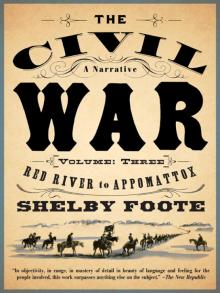 The Civil War: A Narrative: Volume 3: Red River to Appomattox
The Civil War: A Narrative: Volume 3: Red River to Appomattox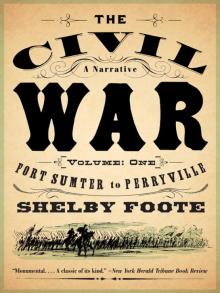 The Civil War: A Narrative: Volume 1: Fort Sumter to Perryville
The Civil War: A Narrative: Volume 1: Fort Sumter to Perryville Jordan County
Jordan County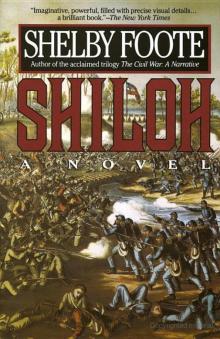 Shiloh
Shiloh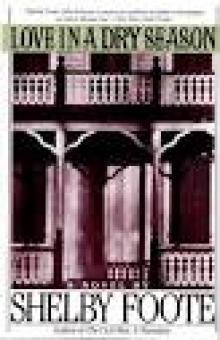 Love in a Dry Season
Love in a Dry Season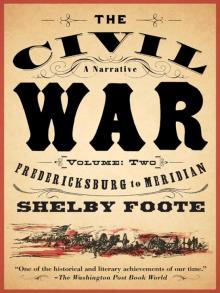 The Civil War: A Narrative: Volume 2: Fredericksburg to Meridian
The Civil War: A Narrative: Volume 2: Fredericksburg to Meridian Chickamauga
Chickamauga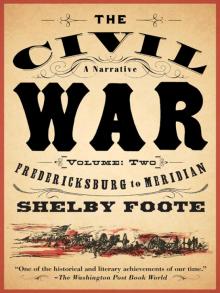 The Civil War: A Narrative: Fredericksburg to Meridian
The Civil War: A Narrative: Fredericksburg to Meridian